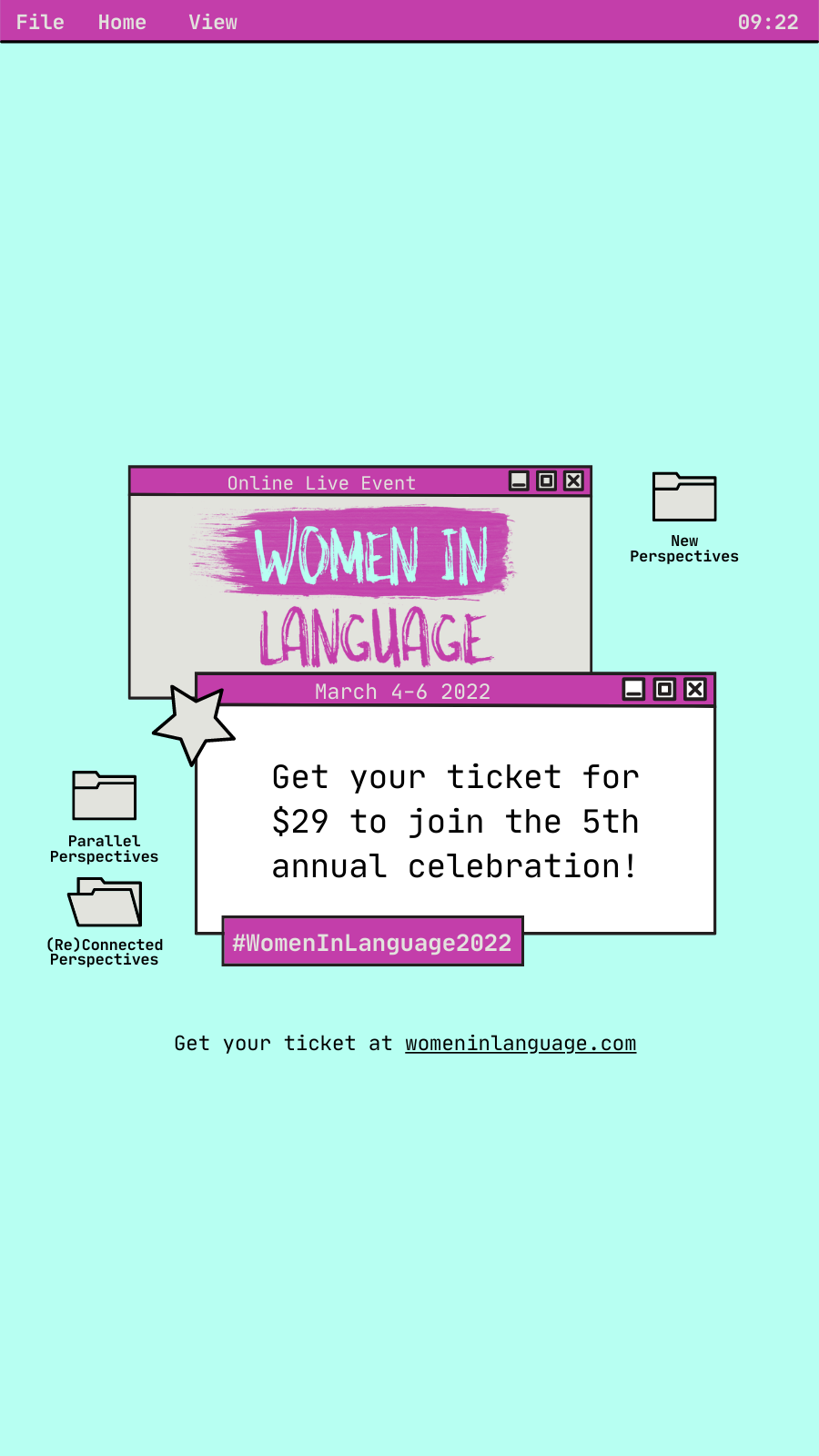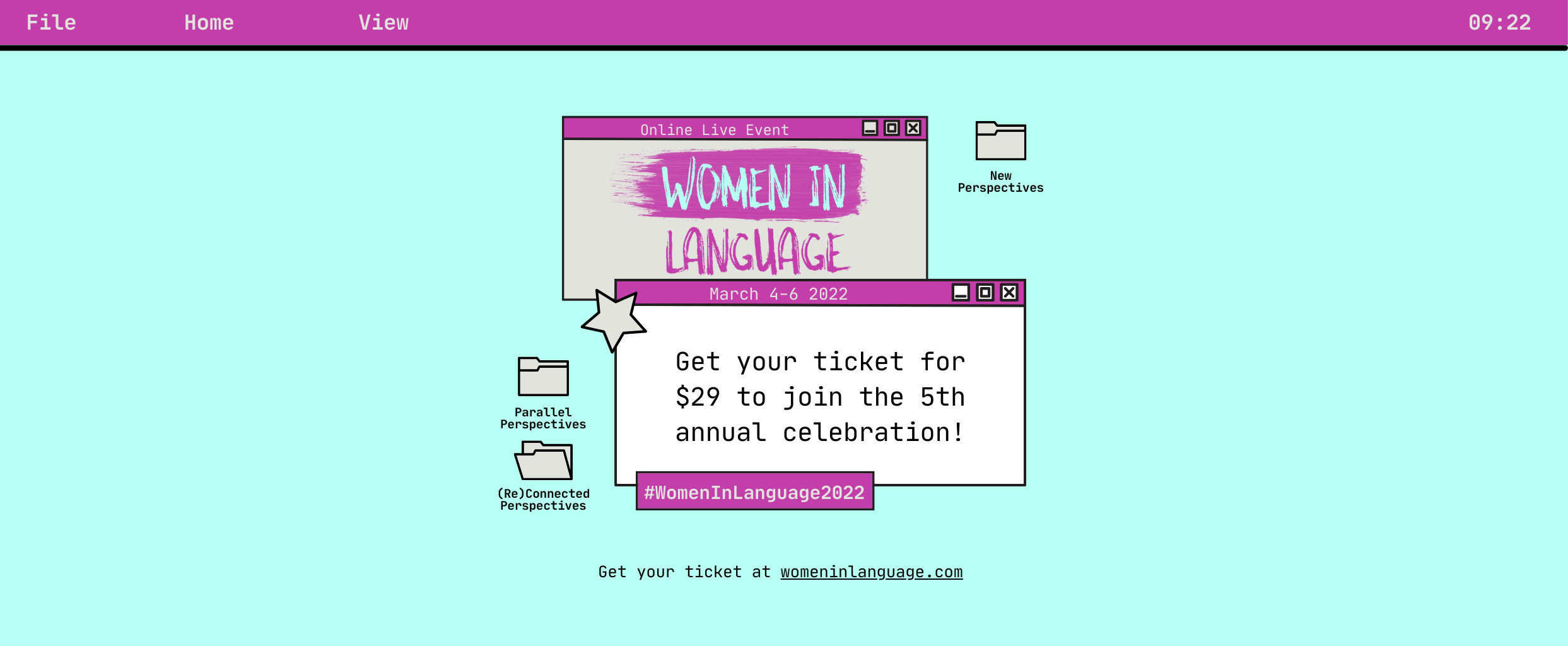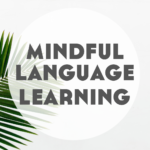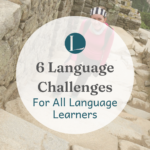February 25th, 2022
Women In Language is back for 2022!
For a fifth consecutive year, Women In Language is back for 2022 to brighten up your March. Here’s what’s to expect at this year’s Women In Language.

We’re delighted to host a great line-up once again for the 5th Women In Language!
Every year this even is such a good chance to reconnect with your language motivation, embrace new perspectives, and discover something new.
Join us live 4-6 March 2022, or catch up with the recordings at a time to suit you.
Tickets are available now for just $29 right here.
Here’s a look at our full line-up of presentations at this year’s event…
Day 1
🤝 Push vs Pull Language Learning – a Perspective on Privilege in Linguistics 🤝
with Jessica Kumar
We love to talk about polyglots, but often only focus on one specific type. IT runs out, there are two types of language learners- what I call “push vs pull polyglots.” There are those who are forced to learn a language because of war, famine, displacement, etc, VS those who learn as a hobby or career boost. Jessica highlights the differences between the two groups and what to be cognizant of as learner.
👪 Multilingual Parenting and Special Needs Children. 👪
with Errol de Jesús
Multilingual parenting has its many challenges and rewards. But what about neurodivergent children and how they acquire languages?
My aim with this presentation is to provide a down-to-earth, transparent look into my autistic son’s journey growing up trilingual. He began showing evidence of speech delay and several other developmental delays around his second birthday.
Now that we have an official diagnosis and are looking into services for him, I thought it would be helpful to share our experience with other parents and guardians in the language learning community.
I will share honest ways I’m approaching this journey with my son. Hopefully sharing my story will encourage other parents and guardians who are helping special needs children learn languages.
🇮🇹 Stuck in a Good Italian. 🇮🇹
with Irene Cangi
Vocabulary enrichment for intermediate and advanced learners of Italian: challenging aspects and handy resources.
🇨🇭 Why Swiss German Is Important And Why Your Dialect Is Too. 🇨🇭
with Mel Turner
There’s a debate about whether or not small languages and dialects are “worth it” when it comes to teaching and learning. I’ll be sharing my own perspective and experience from teaching my dialect of German. In this session, you’ll learn & discover: – How I Ended Up Hosting A Podcast In My Dialect Of Swiss German (Baseldeutsch). – Helpful Resources To Learn Swiss German – Why It’s Important To Continue Teaching Dialects And Small Languages – What I Think Are The Best Ways To Teach A Dialect – How I Structure & Create Content To Make It Easy And Accessible For Learners. It’s my goal to encourage speakers of other “small” languages & dialects to find ways to make their language more easy & accessible for language learners.
💯 Perfectionism in Language Learning: Overcoming Prohibitive Perfectionist Tendencies. 💯
with Heidi Lovejoy
Perfectionism, despite what its name suggests, is more than a desire to be “perfect” or error-free. Rather, perfectionism encompasses a vast array of personal ideologies from all-or-nothing thinking to debilitating fear of failure. Perfectionist tendencies – those actions resulting from perfectionist psychology – can have a profoundly prohibitive impact on how we learn and study languages. In this talk, I will discuss my own personal journey with perfectionism and the extreme negative impact it had on my language learning. I will also share tips for overcoming those perfectionist tendencies that obstruct our language learning processes. Come discover your own unique method to stop allowing perfectionism to dictate your actions, and start creating a language journey that works with your personal inclinations.
Day 2
😎 How to Be Assertive in an English Speaking Environment? 😎
with Archana Parmar
Did you know that speaking assertively can help you manage stress and negative emotions, deal with difficult situations, and express yourself more effectively?
It can also help you avoid taking on too many obligations if you find it difficult to say no to people or ask for what you want.
What is Language of assertiveness?
The ability to express your views, feelings boldly without being rude.
Stop playing a small version of yourself, it’s time to break out of your comfort zone and allow the bigger version of you to shine through.
The talk will cover topics such as;
a. Language that makes and breaks your confidence
b. How you lose power verbally
c. Adjustments to make language work
d. Express opinions with authority
e. Be verbally assertive
😱 Emoji Are Digital Gestures in Online Communication 😱
with Lauren Gawne
Language is not just one skill, but a set of skills and features, some of which we use in parallel. In this talk Lauren Gawne shares her research on the way emoji work in parallel with text in online communication, and how this mirrors the way gestures work in parallel with speech in face-to-face communication. This talk will include insights into how emoji function, and why you tend to reach for hearts, hands and faces before other emoji. It will also include discussion of the way gestures differ across cultures.
💛 Can You Forget Your Native Language? The Sociolinguistic, Intellectual and Emotional Consequences of Language Attrition. 💛
with Agnieszka Murdoch
Language attrition is a loss of proficiency, or decline of native language skills as a result of being isolated from native speakers of the language, or intensive second language acquisition. Agnieszka’s talk will explore what language attrition is, what it is not, and the sociolinguistic implications of the phenomenon for individuals affected by it. It will also look at whether it is possible, and if so – how, to rediscover your voice as a person affected by language attrition. Agnieszka will also bring in her personal story of being affected by language attrition and explore some of the psychological, emotional and intellectual consequences of this experience.
PANEL: Feminism in Our Language World
with Samantha Lassaux, Chesline Pierre-Paul, Martina Gerdts & Archana Parmar
Join our panel discussion this year for an open and honest conversation on feminism in our language world.
👂 Receptive Bilinguals: When Bilingual Children Understand Both Languages but Speak Only One… 👂
with Rebeca Imberg
La crianza bilingüe a veces puede ser un camino con baches a los que no estamos preparados y uno de los más grandes es cuando nuestros niños nos entienden, pero sólo nos responden en la lengua mayoritaria. En esta ponencia te enseño cuáles son las características de este tipo de niños, lo que tenemos que tomar en cuenta para cambiar su patrón lingüístico y las mejores estrategias de comunicación para incentivar el uso de la lengua minoritaria con nosotros, dentro y fuera de casa.
Bilingual parenting can sometimes be a bumpy road for which we are not prepared, and one of the biggest challenges is when our children understand both languages but only respond in the majority language. In this lecture I will show you the characteristics of this type of bilingual children, what we need to take into consideration to change their linguistic pattern and the best communication strategies to encourage the use of the minority language with us, inside and outside the home
🫂 Heritage Languages: It’s Not Just Academic. 🫂
with Anita Sachariah
Many 1st generation children of immigrants find themselves in a situation where they lose their heritage language, as the dominant language crowds it out. Why are some languages more successful at being passed on than others? How can parents and educators today overcome the reluctance of learning heritage languages?
One simple strategy is to realize that heritage languages are inextricably tied to identity formation, connecting the user to their culture and ancestry. When educators and parents acknowledge this emotional connection and tend to it, they will ultimately be more successful at passing on these languages. Drawing upon her own experience of relearning her own heritage language, she will lead a discussion on the myth and constraints of heritage languages. Anita will discuss her experience as a Learning Coach with BhashaKids, in helping South Asian parents and language teachers grapple with this elusive topic.
🤗 AAC: the What, the Who, the Why, and the How Does This Relate to Language Learning? 🤗
with Lauren Williams
Come explore the world of AAC, what it is, who uses it and why it is used. Lauren will work to combine two of her greatest passions, Speech Language Pathology and Language Learning to discuss how AAC might at all be related to your journey of learning a new language or a few. You may step away from this talk with more questions than answers in a hope to ignite possibilities and offer novel perspectives. If you like to experiment with your language-learning routine, you’ll surely enjoy this presentation.
🎧 Podcasting as a Tool to Recover and Promote Female, Feminist, and Otherness Genealogies in Translation and Interpreting in Latin America. 🎧
with Belén Nuñez and Mariana Favila
Although it is mainly women who work in the language service industry, their contributions are frequently overlooked and unacknowledged. As translators, interpreters, and proofreaders, women are expected to remain silent and invisible. In this context, we believe that creating support networks of female and LGTBIQ+ translators and interpreters is especially important in the world we live in today. With this in mind, we created Tradhumanas de Nuestramérica (TDN), a podcast that intends to contribute to the creation of female and feminist genealogies in translation and interpreting in Latin America, a region that has also been heavily ignored in the creation of theory and knowledge. In this session, we will share our experience in the creation and development of TDN, so that more people may feel inspired to overcome the fear of introducing themselves to feminism and gender studies, and will then dare to combine them with their occupation.
👶 You – Yes, YOU! – Can Teach Your Baby American Sign Language! 👶
with Sara Holmes
Anyone can reap the benefits of teaching their baby American Sign Language (ASL), and that includes YOU! You don’t have to be a professional teacher – or even know much about ASL – in order to start using this beautiful language in your child’s life. I’ll share my own family’s journey of doing just this, including why and how we did it. With my more laid-back approach, I have taught/exposed my toddler to over 300 ASL signs, not to mention leveraged it to teach her Spanish and – accidentally – French!
If I can do it, anyone can!
🤫 Let’s Talk about Parsnips. Taboos in the Language Classroom. 🤫
with Abigail Fulbrook
Let’s talk about parsnips. Parsnips are those taboo topics that ‘shouldn’t’ be mentioned in the language learning classroom. It’s an acronym that means politics, alcohol, religion, sex, narcotics, -isms and pork. Should we continue to ignore them? What are the benefits of including ‘taboo’ subjects in the classroom? In this talk I’ll give advice on how to introduce these ‘taboo’ topics into the classroom, how to set up a good and safe conversation, and my experiences of doing this. I want to encourage all language teachers to be brave, feel supported, and teach ‘outside-the-box’ to the benefit of everyone.
Day 3
💪 Language Revitalisation: Everyone Has a Role to Play. 💪
with Karla Zuluaga
2022 marks the beginning of the United Nation’s International Decade of Indigenous Languages, but what does this actually mean for everyone? Perhaps you have heard of endangered languages or language revival and revitalisation before. Some perceive these as issues that are dealt with only by governments, linguists or the indigenous communities themselves. However, I am here to tell you that everyone has a role to play whether it be at an individual level, within your local communities or internationally. I will discuss ways in which we as a global community can help to spark change and embrace the world’s indigenous languages and cultures.
🌈 Implementing Trans Inclusive Language in My Language Learning: With German, Portuguese, and English Examples. 🌈
with Martina Gerdts
In this talk, I will show the audience how they can implement trans-inclusive language in their language learning. Different areas of language research, e.g., Linguistics, Language Teaching, and Translation studies show us techniques to do that. We will discuss these techniques during the talk.
As I am a German native speaker who studies Portuguese linguistics, I will focus on examples of trans-inclusive language in German, Portuguese, and English. The talk is going to be multilingual. One of the two parts, either the spoken form or the slides, will be held in English so that the audience will be able to follow the talk even though they might not understand German or Portuguese.
🤩 When You Want It All: How to be an Effective Language Learner if you’re Multipassionate. 🤩
with Marjolein Benschop
Do you find it hard to stick to just one hobby or language? Do you have so many interests and goals that you can’t decide what to focus on? Welcome to the multipassionate club! Learning a language can be tricky in itself, but even more so if you have so many interests that you can’t stick to (just) one language. You might feel like you’re all over the place and see little results, which can then result in you feeling guilty, overwhelmed and frustrated. Yet forcing yourself to just one objective might also not feel right to you. So what now? In this talk, I will discuss how to manage one’s beliefs, expectations and behavior to feel more confident and fulfilled in the language learning process. I’ll also discuss practical strategies to choose, plan and act on your language goals so that the learning experience becomes more enjoyable and successful.
🇻🇳 The Evolution of Vietnamese Language. 🇻🇳
with Quyen Vo
Vietnamese is one of the most widely spoken languages in the world, ranks 21st among the 25 most spoken languages. The language has had a long and difficult history of formation. Rather than being defeated by Chinese, French language, and Roman alphabet, the language has made them its own. But, in the near future, it may be facing a new crisis: English gaining a foothold – vocabulary for modern technology. Come and join me to discover the evolution of Vietnamese language and discuss the question: Is this a struggle for an ancient language tied to a nation which has experienced a long and turbulent history?
🎲 Newsflash: Games Aren’t Just for Kids Anymore! 🎲
with Vickie Kelty and Laia Moret
Sure, you’ve played a game in another language, but have you ever turned your language learning into a game?
In our talk, we’re going to show you how games you enjoy can become your new favorite way of learning the language you love.
Along the way, we’ll share how this non-traditional and super fun way of learning a language is such a powerful way to progress – plus how games have influenced our own language learning.
Get ready for some live games. See how we use them to learn three different languages – for our talk it will be a short example in French, Spanish, and English – no better way to learn than to see how it’s done and do it yourself.
There’s no losing when learning a language is a game. What’s better than having a blast and learning a language you love at the same time! Let’s roll! 🎲
✨ Towards Risk Taking: How Do We Inspire Our Future Language Learners? ✨
with Emma Archard
As a child learning my mother tongue, I was rewarded and praised for every word I spoke. I proudly mastered it. As a languages’ student in school and Uni, I became fearful and reluctant. Terrified of failure: Not wanting to take that risk. Now, as an experienced language teacher of 25 years, embarking on learning a new language, I have felt the fear and reluctantly embraced it, reminding myself of the daily words of encouragement I give my students. I am making progress and enjoying it.
Teaching young people diagnosed with Autistic Spectrum Disorder (ASD) and specific learning difficulties has made me reconsider how languages are taught. What lessons can we gain from the teaching of these children? How can learning be more relevant for the future of our young people? How can we support and inspire not only our young people but more adults to learn languages in a World where speaking your mother tongue is no longer enough?
❤️ Trauma-Informed Language Teaching and Learning. ❤️
with Paulette Jendre
Why should we all care about trauma-informed language learning? More than 50% of adults have had at least one traumatic experience during their lifetime, and anyone who has ever found it challenging to concentrate on their work due to difficult emotions knows that it’s hard to learn while upset. A trauma-informed approach is both kinder and more effective.
This talk is for language teachers and learners. With best practices founded on informed compassion, we can avoid triggering topics or navigate them mindfully. We can develop specific linguistic skills to assert boundaries in our target languages. This talk will share practical methods and materials, and will also review the relevant scientific research.
Paulette is a language teacher who has worked with refugees, survivors of family violence, and those in mental health crisis. She is also a language lover whose traumatic experiences have changed the way she learns.
Get your ticket for $29 now!
Join us for our fifth Women in Language, an online event created to champion, celebrate and amplify the voices of female and non-binary in language learning.
Passionate about language learning? About culture? Education? Social topics? Equality? Self-improvement? Holistic learning?
This March, join us in celebrating the many voices of language learning.
You want to learn more about different perspectives in languages, how to experiment with languages and delve into new techniques, and hear inspiring stories about other language learners and communities across the globe. And you want to connect with others who share your love of languages.
Women in Language is an event where you can connect, find inspiration, and learn.
But that’s not all Women in Language is. It’s a platform to champion new and lesser heard voices. Now more than ever, it’s important for more voices to be heard.
Get your ticket for just $29 to join us live 4-6 March right here.







